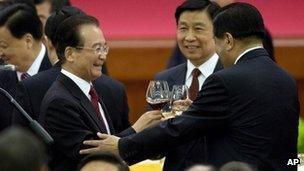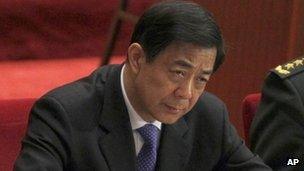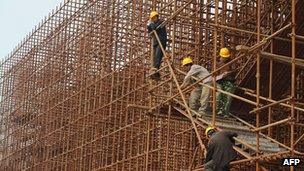Bo Xilai: China leaders try to put scandal behind them
- Published
- comments

China's leaders have wanted to show they are united - with any rifts from the Bo Xilai scandal behind them
Ever since the scandal surrounding Bo Xilai erupted into the open, China's leaders have seemed divided, the political narrative here uncharacteristically adrift.
Now, having decided how to deal with Mr Bo, the Communist Party is, finally, moving to reclaim the initiative and re-focus attention on its coming leadership change.
But the whole affair has exposed tensions which run to the very heart of the way the party exerts power in China, and which its next generation of leaders will have to grapple with.
The nine men on the Politburo's Standing Committee appeared together, in public, at the weekend, sitting round the same table, external, at a reception to mark 63 years since the founding of the People's Republic.
A day after reaching agreement on how to handle Mr Bo's transgressions and, therefore when to stage their leadership transition, this was a top team that wanted to show it's united, any rifts behind it.
Paralysis and infighting?
China's leaders lost control of the narrative in February when Wang Lijun, Bo Xilai's deputy, fled to the US consulate in Chengdu and made his explosive allegations that Mr Bo's wife had murdered a British businessman.

Bo Xilai has not been seen in public since the investigation into him was announced
It triggered a crisis, because Bo Xilai was a contender for the party's new leadership line-up and had powerful backers.
Almost with a sigh of relief, the Global Times, a Party-run paper, external, welcomed that "the date of the party congress and the handling of Bo, two topics that have drawn huge attention, have finally became clear," saying it "demonstrates the ability of the [Party's] Central Committee to reach consensus on major issues."
But the need to reach consensus has meant months of what looked like paralysis and infighting.
Instead of an open, transparent legal process, Mr Bo has been hidden away, under secret, internal Communist Party investigation.
The leaders had to resolve their differences over him before they could move ahead with deciding who will fill the seats in the next leadership line-up.
What has filled the void in the meantime has been what the Global Times calls "wide speculation... with diverse opinion on the web that spreads despite attempts to control content."
The Communist Party's secretive decision-making and its aversion to airing its internal arguments openly look increasingly hard to sustain in a nation where three hundred million people now debate almost everything on the internet.
In its comment, The Global Times said: "China cannot expect to run anything, including politics, entirely smoothly. The frenzy of public opinion before the congress may offer some materials for authorities to reflect on. Chaotic public opinion is a result of lack of information."
Controlling information
So will China's next leaders have to be more open? The Global Times seems to think so.
"The authorities' effort to ensure candid transparency on crucial information is the condition and prerequisite for forging a public consensus in the future. China will advance toward the disclosure of information," it opined.
But controlling information is one of the most important ways the party retains its monopoly on power. It will be a hard habit to break. And when you are open it can easily backfire.
Over the weekend China's media has been carrying commentaries designed to spread the party line on Bo Xilai's case. His downfall is being presented as an important signal that the party will not tolerate corruption.
"Through Bo's case, a principle was upheld - no matter how high the position a party member holds and how influential he is, he will be held responsible and face severe punishment for violating party disciplines and laws," wrote the state news agency Xinhua, external.
"The decision is another example in showing the CPC's clear stance and firm determination to fight corruption. It will be welcomed by the people," it added.
But already many are sceptical about the implication that Mr Bo is a lone bad apple and his downfall is nothing to do with politics.
The long list of charges against him stretches back 15 years and includes "receiving huge bribes personally and through his family", "improper sexual relations with a number of women", and "abusing his power".
"These crimes can be applied to all party officials," was a typical comment on China's microblogs. "Old tricks to discredit someone by sex scandals" was another.
"How could the party promote him all the way to the politburo?" wrote one user. Another asked "Who should take responsibility for wrong decisions in promoting Bo?"
So rather than looking in control and dealing even-handedly with corrupt officials, the party may find itself tarnished by association with Mr Bo.
Many in China already believe all officials are corrupt, and only those who fall out of favour get prosecuted, they'll see this case as confirmation of that.
It's not lost on many that if Wang Lijun had never fled to the US Consulate and spilled his secrets, the Communist Party may never have investigated Bo Xilai.
It might instead have been on the verge of making him one of China's next senior leaders.
Consensus first
Under China's system the Communist Party controls the media, the police, the prosecutors and the courts. The party is not subject to outside checks and balances.

China is the world's second biggest economy - but growth is slowing
That's why Mr Bo has been dealt with, by the party, in secret. The courts will now simply confirm the party's decisions about how to punish him.
But what its next leaders will have to grapple with is whether that can continue to be the case. Is the system compatible with managing a nation as big and complex as China today?
Can one party monopolise power and police itself while running the world's second biggest economy and governing well over a billion people?
Facing growing public scepticism, challenged by corruption among officials, and an economy that is slowing how will China's next leaders ensure clean and efficient government.
The official China Daily - in an article titled China at a critical time as CPC congress approaches, external - said: "The most pressing issue for the Chinese public is the uninhibited and widespread abuse of power and corruption among government officials and businessmen."
It said China needed to adapt, "giving more respect to the will of the people in making policies will continue to be a challenge for the CPC", adding, "when the congress opens, people inside and outside China should closely watch the country's new leaders, as what they say and do may signal the beginning of great changes in China and the rest of the world."
The tricky bit is that they are likely to have to reach consensus first before any "great changes" happen.